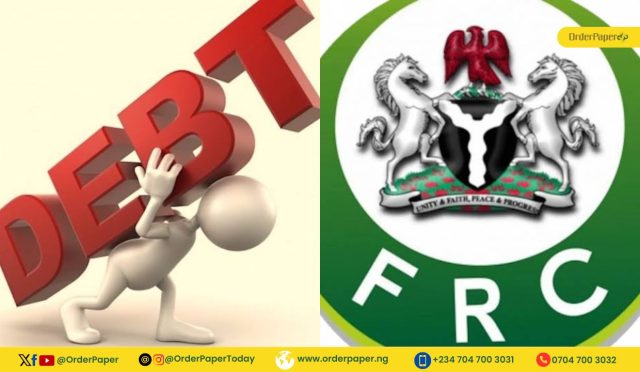Nigeria’s debt crisis calls for an urgent passage of the FRA amendment bill by the National Assembly

Nigeria’s public debt has surged dramatically, increasing from N12.8 trillion in 2015 to N87.91 trillion in 2023, representing an astonishing 585% rise, as per the National Bureau of Statistics. This debt increase, along with fluctuating forex rates and inflation, has worsened the economic challenges faced by Nigerians.
According to a report by Statista.com on September 22, 2023, Nigeria ranks as the second-largest debtor in Sub-Saharan Africa, trailing only South Africa.
Soludo (2003) suggested that countries typically borrow for two main reasons: to finance higher investment or higher consumption, and to avoid budget constraints. Ideally, borrowing should promote economic growth and reduce poverty. However, Soludo argued that excessive debt can become burdensome, crowding out investment and growth as debt servicing costs soar.
The continuous quest for loans in the name of “development” without adequate checks and transparency creates opportunities for corruption. The Fiscal Responsibility Commission (FRC), which advises the government on borrowing within set limits and aligning with the country’s medium-term expenditure framework, lacks the prosecuting power to enforce financial accountability among Ministries, Departments, and Agencies (MDAs).
For example, in the 2024 budget, over 8 trillion naira is allocated for debt servicing out of a total budget of 28.7 trillion naira. This necessitates stringent financial management to ensure resources are used wisely and deliver value for money in all government activities.
A recent report by the GIFT cluster project on the Revenue Remittances Compliance Index (https://shorturl.at/dm8jS) revealed widespread noncompliance with the Fiscal Responsibility Act (FRA) 2007 among federal MDAs, who fail to remit funds to the CRF or audit their accounts. This issue persists due to the FRC’s lack of prosecuting authority.
Given Nigeria’s dire financial situation, passing the Fiscal Responsibility Act (FRA) 2007 Amendment Bill 2024 is critical. The bill, which recently passed its first reading in the National Assembly, seeks to address systemic issues in public finance management and enhance accountability.
Despite Nigeria’s high debt, the country has the potential to borrow more. However, doing so without addressing fundamental public finance management problems would be counterproductive.
The FRA Amendment Bill, if enacted, aims to eliminate revenue leakages, improve remittance procedures, and enforce stricter accountability measures. This would foster a sustainable financial system that supports long-term economic growth.
Key provisions of the FRA Amendment Bill include introducing stricter oversight and accountability for government spending, reducing corruption, and ensuring efficient use of public funds. The bill also aims to tighten borrowing regulations, ensuring loans are used productively, and improve overall fiscal management.
Passing the amendment would empower the FRC to prosecute non-compliant MDAs, compel them to audit their accounts, and ensure they remit funds appropriately. This would prevent reckless spending of public funds and promote value-for-money practices.
Furthermore, the legal framework aims to enhance public finance management and ensure the effective use of public funds in crucial sectors like healthcare, education, and infrastructure, thereby improving the quality of life for Nigerians and supporting national development goals.
Passing the FRA 2007 Amendment Bill 2024 is essential for addressing Nigeria’s fiscal challenges. With soaring debt levels and widespread economic hardship, reforming public finance management is imperative.
We urge the National Assembly to expedite the bill’s passage and ensure it is swiftly sent to the President for approval. This action would demonstrate the APC-led government’s commitment to improving the lives and wellbeing of Nigerians, fulfilling its “Renewed Hope” promise.
Written by Tochi Onyeubi and Bassey Bassey of HipCity Innovation Centre, an Abuja-based research, development and advocacy organization with the mandate to strengthen citizens participation in governance. We can be reached on 08039906111 or info@hipcityinnovationcentre.org



